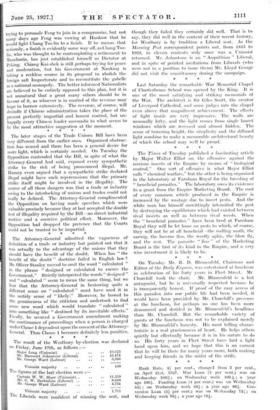The later stages of the Trade Unions Bill have been
very different from the earlier ones. Organized. obstrue- tion has ceased and there has been a general desire for more light, which is certainly needed. On Tuesday the Opposition contended that the Bill, in spite of what the Attorney-General had said, exposed every sympathetic strike to the risk of being pronounced illegal. Mr. Harney even argued that a sympathetic strike declared illegal might have such repercussions that the primary strike itself might be involved in the illegality. The source of all these dangers was that a trade or industry owing to the interlocking of unions and trades could not really be defined. The Attorney-General complimented the Opposition on having made speeches which were valuable precisely because they at last accepted the double test of illegality required by the Bill—no direct industrial motive and a coercive political effect. Moreover, the Opposition had dropped the pretence that the Courts could not be trusted to be impartial. * * * *














































 Previous page
Previous page